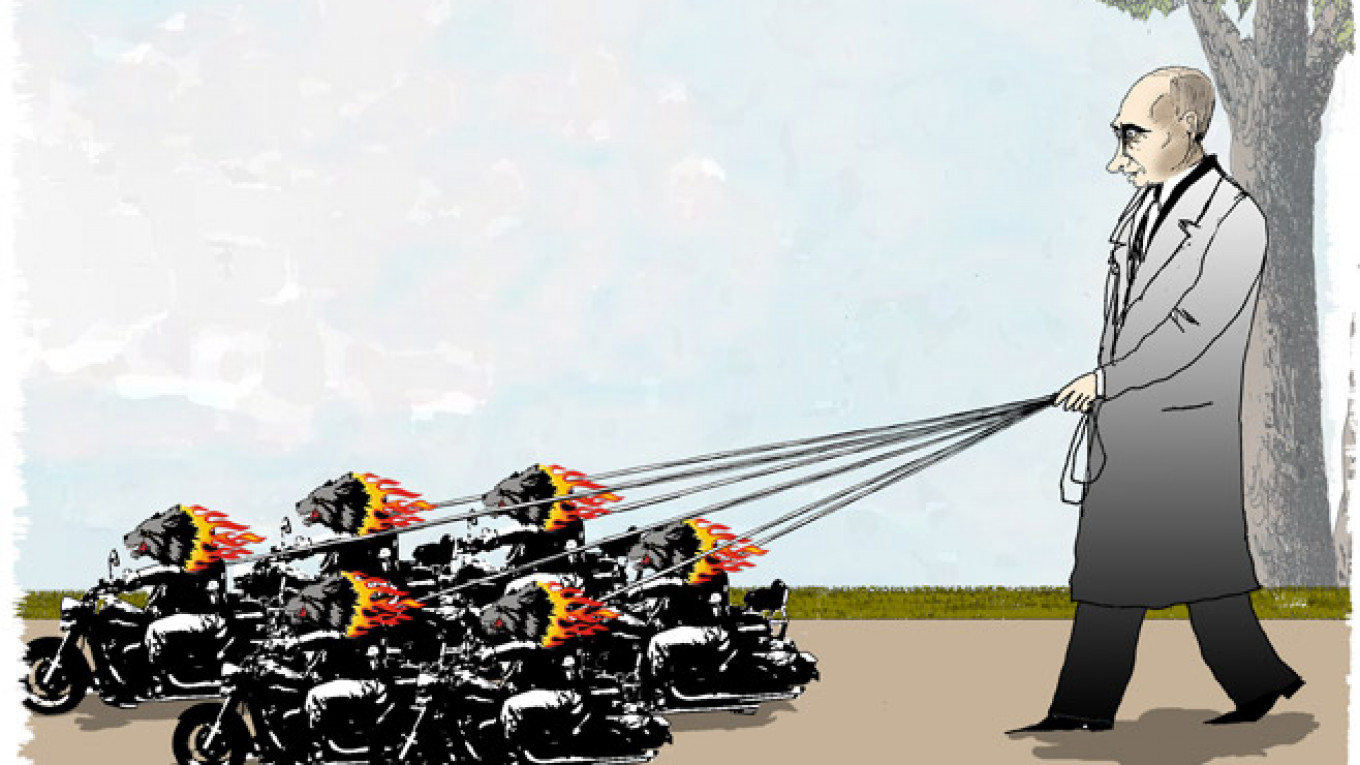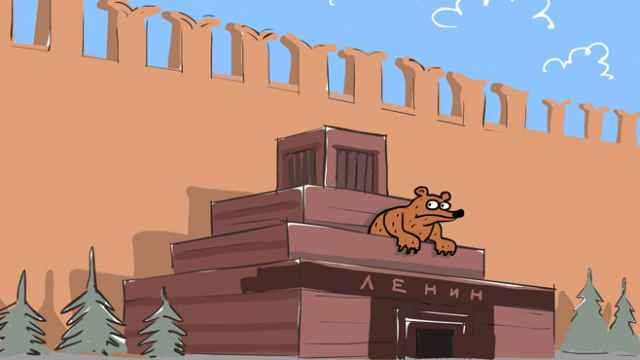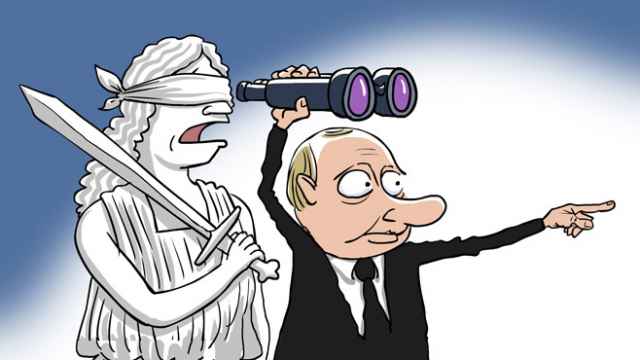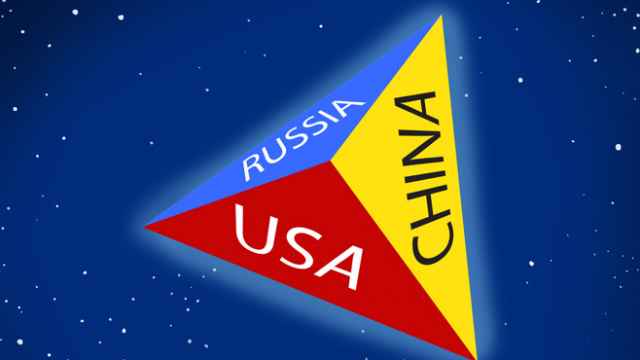Seriously, what is it about the Night Wolves motorcycle group that makes them such a toast of the Kremlin?
The latest — admittedly, unconfirmed — stories are that they have been granted a sizable tract of land in Sevastopol, Crimea, and for free, or near enough.
Regardless of this most recent story, a report published by Alexei Navalny, and based on official records, found that the Night Wolves have since 2013 been awarded grants worth 56 million rubles — more than $1 million. This was ostensibly for various purposes, ranging from putting on over-the-top "patriotic" extravaganzas to participating in a study on, believe it or not, "identifying the place of motorcyclists in the spiritual life of Russian society."
Beyond that, they have been showered with favor and indulgence. Putin has several times ridden with the Wolves (albeit on a trike) and in 2013 awarded their leader, Alexander Zaldostanov, the Order of Honor.
Considering that this is a group which was founded in the 1980s as a counterculture movement, that claims to reject the law, and which has been involved in gang clashes with other motorcycle groups, this may seem paradoxical.
However, in practice the Wolves are nowhere near as rebellious as they may appear, for all their chromed hogs and studded leathers. Instead, they are in many ways a case study in the Kremlin's strategy of adopting and taming potentially hostile groups and using them precisely as tools of control — counter-counterculture, as it were.
Of course, his involvement with the group plays to President Vladimir Putin's carefully curated macho, bad-boy image. He first publicly visited them in 2009, and has never looked back. Putin himself seems to have a fondness for real bruisers and brawlers — witness his relationship with Chechnya's Ramzan Kadyrov (himself a friend of Zaldostanov's) — but this is more than just a bromance of PR convenience.
After all, even when he first met the Night Wolves, they already embodied many of the values and virtues that would come to the center of Putinism 2.0 or 3.0, whichever is dominating his third presidential term. They were muscular nationalists; indeed, Zaldostanov had long championed the cause of returning Crimea to Russia.
Furthermore, they had forged their alliance with the Russian Orthodox Church, not least thanks to their outspoken intolerance of alternative lifestyles. When Zaldostanov met Putin in 2009, he was in the midst of organizing a bikers' gathering in Sevastopol — international, but with a strong Russian nationalist flavor — which had the blessing of Patriarch Kirill, primate of the Russian Orthodox Church.
In this respect, Zaldostanov and the Wolves were "new Putinists" even before Putin himself.
Unsurprising, then, that they (and other groups, from "military-patriotic education" clubs through to Church youth groups) also become a vehicle to try and imbue a formative generation of Russians with the values of today's Kremlin.
Beyond that, though, for all that they may seem to ape the so-called "outlaw motorcycle gangs" such as the Hells Angels and the Bandidos, the 5,000-strong Night Wolves are best thought of as auxiliaries of the state. Rough and ready, to be sure, and ready to be rough, but they understand the limits of permissible activity.
As such, they occupy the cultural niche that the real outlaws would otherwise colonize, and deny it to groups that would be rather less congenial for the Kremlin. After all, the "real" outlaws are not just bikers but also contain, along with a fair number of metal-heads and weekend riders, drug dealers and protection racketeers galore.
Indeed, according to a police source, the Wolves may be deployed as weapons against the outlaws, such as in an infamous clash with the Three Roads biker club in 2012, in which one was shot and killed. The cause was not just that the Three Roads had split from Night Wolves precisely because of their cozy relationship with the state. They were also close to a U.S.-based gang.
Associated with drug trafficking and a range of other violent crimes, the Bandidos — whose motto is "we are the people our parents warned us about" — are also the people the Kremlin wants kept out.
This points to what may be the Night Wolves' greatest value, as assets for the Kremlin. They are undoubtedly great tools for propaganda provocations such as their nose-thumbing trip to Berlin to mark Victory Day. With one of their mottos being "wherever the Night Wolves are, that should be considered Russia," even the threat of their presence spreads diplomatic dismay and disarray.
They are also more direct assets. A potential militia at home, after Pussy Riot's "punk prayer," the Wolves offered to guard cathedrals against "hooligans." More recently, Zaldostanov has been a leading light in the "Anti-Maidan" movement to oppose liberal protests in the street, and the Night Wolves have been sanctioned by the U.S. government for recruiting and supporting separatist fighters.
Outlaws yet tools of the state; feted by the Kremlin yet deniable: classic tools of Russia's modern hybrid politics.
Mark Galeotti is professor of global affairs at New York University.
A Message from The Moscow Times:
Dear readers,
We are facing unprecedented challenges. Russia's Prosecutor General's Office has designated The Moscow Times as an "undesirable" organization, criminalizing our work and putting our staff at risk of prosecution. This follows our earlier unjust labeling as a "foreign agent."
These actions are direct attempts to silence independent journalism in Russia. The authorities claim our work "discredits the decisions of the Russian leadership." We see things differently: we strive to provide accurate, unbiased reporting on Russia.
We, the journalists of The Moscow Times, refuse to be silenced. But to continue our work, we need your help.
Your support, no matter how small, makes a world of difference. If you can, please support us monthly starting from just $2. It's quick to set up, and every contribution makes a significant impact.
By supporting The Moscow Times, you're defending open, independent journalism in the face of repression. Thank you for standing with us.
Remind me later.








